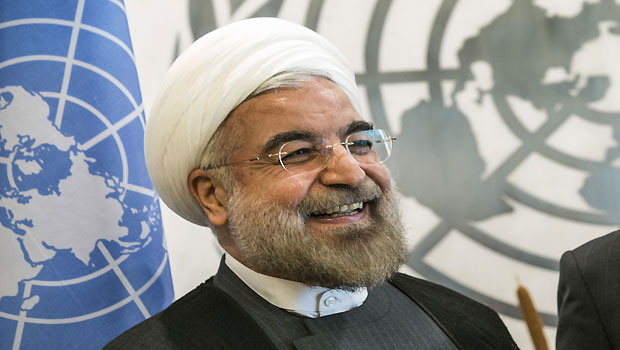These days, the happiness of my Iranian friends and acquaintances regarding the prospects of their new president, Hassan Rouhani, improving Tehran’s relations with Washington, can be clearly seen.
In fact, they have every right to feel this way, particularly after eight lean years of Mahmoud Ahmadinejad’s presidency: a hardline and dogmatic figure who formulates his worldview according to his mood swings and narrow ideological/theological convictions. We, as Arabs— and regardless of the way we approach the dynamics of the Iranian-US relations that is currently in the process of change—should not misinterpret this rapprochement.
Any nation would rather enjoy excellent political, economic, and cultural relations with the world’s only superpower, rather than being besieged and condemned, having their ideology and culture questioned. This is precisely the case with Iran and the Iranians in the era of Rouhani, the pragmatist, and the skillful foreign policy of courteous diplomat Mohammad Javad Zarif who studied in the US and thus perfectly understands how Washington and Tehran think, and more importantly what they want from each other.
It is quite natural for the Iranian leadership to gamble on the US being lax towards Iran and its regional ambitions in the era of a passive US president who holds weak convictions, such as Barack Obama. It has been clear from the way the White House dealt with the Syrian ordeal and the consequences of the “Arab Spring” that the last thing Washington wants is any new development forcing it out of its domestic cocoon or distracting it away from overcoming its lengthy economic crisis.
This is what concerns us now. However, there are issues which must be tackled frankly: First, for our own good and in order not to lose our way; second, for our Iranian brothers who want to coexist with their Arab neighbors; and third, for the international community which we cannot turn our back on as this would in no way serves our interests.
As for our domestic situation, we have to admit that we are in crisis. We are suffering from an acute crisis whose causes are partly chronic and partly temporary. Then came the Arab Spring to shake us out of the so-called “comfort zone” that had prevented us from realizing just how serious this crisis was. After years of helplessness and denial in Tunisia, Egypt, Libya, Syria, and Yemen, we have witnessed revolutions of change; i.e. which have not achieved everything they initially set out to achieve. Although these revolutions have managed to shake or bring down these former regimes due to their intellectual bankruptcy and political malpractice, they also produced generations that are angry and unable to fully grasp the meaning of political or state “institutions.”
As for our relationship with Iran, it is “problematic” to say the least, or shall we candidly just say antagonistic. If we go back in time to the early 1970s, the days of “exporting the revolution,” we find that the normal reaction was to repel Tehran’s “expansionist” approach. The first line of defense in that era was Saddam Hussein’s Iraq which fought a costly war with Iran— on human, economic, political, and religious levels—the heavy price of which we are still paying for today.
With the Iran-Contra scandal, the anti-Israel slogans of the Islamic revolution practically disappeared from the scene. As a result, and after Ayatollah Khamenei drank, as he put it, the “cup of poison” when he described the signing of the UN-mediated truce between Iran and Iraq in 1988, the Iranian leadership embarked on adopting a more prudent and intelligent approach towards its Sunni neighbors who were on a state of alert across the Arab world, Afghanistan, and Pakistan.
The crowning moment of the Iranian leadership’s success came during the presidency of the “reformist” Mohammed Khatami (1997-2005) when “moderate” Iran made sure to place Iraq at the heart of Washington’s retribution for the 9/11 attacks. Iran gave its silent consent to the invasion of Iraq in 2003, and later to the execution of Saddam Hussein. Tehran also managed to step up the tempo of its nuclear program while Washington was busy “draining the sources of terrorism” in Afghanistan and “de-Ba’athification” in Iraq.
After Khatami, Mahmoud Ahmadinejad—the hardline conservative—took over the presidency with the blessing of the Supreme Guide Ali Khamenei and the support of the Army of the Guardians of the Islamic Revolution (pasdaran). Ahmadinejad’s provocative political discourse earned Iran Washington’s enmity but strengthened its geopolitical position in the name of the so-called “resistance” project. This project included placing Lebanon, Syria, and Iraq under the Iranian umbrella, with the commander of the Iranian Revolutionary Guards Corp (IRGC) Quds Force, Brigadier General Qassim Suleimani, becoming one of the most important figures in the region.
Today, after eight years of political and intellectual diaspora as well as the “Green Revolution,” the Supreme Guide’s Iran returns with a new and moderate face as president, selling the West the marketable commodity of moderation having imposed a fait accompli on the region in cooperation with Moscow, amid Israel’s deafening silence.
Finally, what about the international community?
Today, Rouhani stands at the UN General Assembly addressing the international community that very much leans towards believing him and adopting his perspective in order to turn over a new leaf and start a new era of constructive collaboration. Today, it is the Arabs’ turn to swallow the poison administered by the Obama administration that has let Syrians—and before this, the Palestinians— down, and sent wrong signals to all of the regional players in the Middle East.
Politicians in the Arab world and the international community are well aware that the Supreme Guide Ali Khamenei remains the real decision-maker in Tehran and that the velayat-e faqih (Guardianship of Jurists) project remains in full swing, being carried out under the slogan of “resistance” which many feel has lost its meaning. As for the change in the presidency, this is just a transitional period for the Iranian administration in order to take a breath and seize the opportunity.
